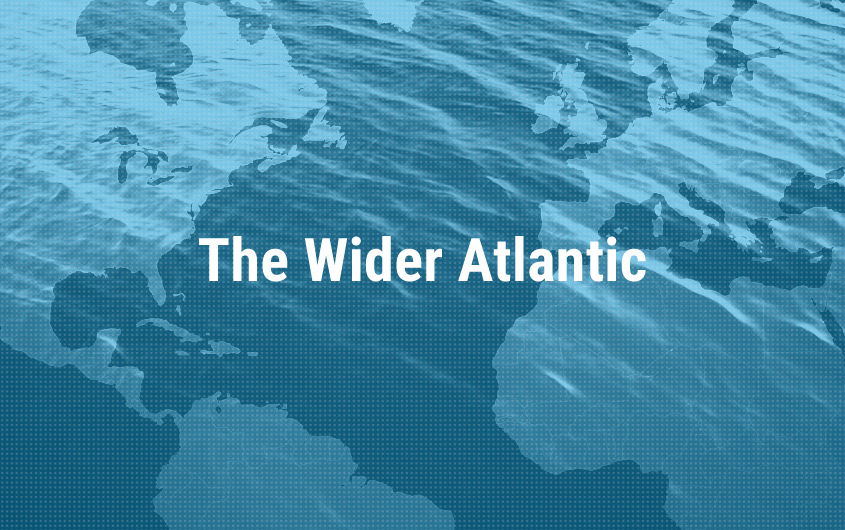
Companies Compete. Countries Pursue Their Interests. That’s a Big Difference.

Peter S. Rashish
Vice President; Director, Geoeconomics Program
Peter S. Rashish, who counts over 30 years of experience counseling corporations, think tanks, foundations, and international organizations on transatlantic trade and economic strategy, is Vice President and Director of the Geoeconomics Program at AICGS. He also writes The Wider Atlantic blog.
Mr. Rashish has served as Vice President for Europe and Eurasia at the U.S. Chamber of Commerce, where he spearheaded the Chamber’s advocacy ahead of the launch of the Transatlantic Trade and Investment Partnership. Previously, Mr. Rashish was a Senior Advisor for Europe at McLarty Associates, Executive Vice President of the European Institute, and a staff member and consultant at the International Energy Agency, the World Bank, UN Trade and Development, the Atlantic Council, the Bertelsmann Foundation, and the German Marshall Fund.
Mr. Rashish has testified before the House Financial Services Subcommittee on International Monetary Policy and Trade and the House Foreign Affairs Subcommittee on Europe and Eurasia and has advised three U.S. presidential campaigns. He has been a featured speaker at the Munich Security Conference, the Aspen Ideas Festival, and the European Forum Alpbach and is a member of the Board of Directors of the Jean Monnet Institute in Paris and a Senior Advisor to the European Policy Centre in Brussels. His commentaries have been published in The New York Times, the Financial Times, The Wall Street Journal, Foreign Policy, and The National Interest, and he has appeared on PBS, CNBC, CNN, NPR, and the BBC.
He earned a BA from Harvard College and an MPhil in international relations from Oxford University. He speaks French, German, Italian, and Spanish.
If it becomes a new White House mantra, a key paragraph that appeared in an op-ed by National Security Advisor H.R. McMaster and National Economic Council chief Gary Cohn in the wake of President Trump’s trip to Europe for the NATO and G7 summits would risk distorting U.S. engagement with the world.
Writing on May 30 in The Wall Street Journal, McMaster and Cohn state:
“The president embarked on his first foreign trip with a clear-eyed outlook that the world is not a ‘global community’ but an arena where nations, nongovernmental actors and businesses engage and compete for advantage. We bring to this forum unmatched military, political, economic, cultural and moral strength. Rather than deny this elemental nature of international affairs, we embrace it.”
While the relish with which Messrs. McMaster and Cohn accept the idea that there is no cozy “global community” may be a bit off-putting, the basic assumption that interactions among countries are not like a local council meeting in small-town America (or Germany) is correct. As far as national security is concerned, there are few if any enforceable laws to deter and punish bad behavior, so countries have considerable freedom to conduct themselves the way they want. The result is an unruly world.
Now, if this commentary were a clear statement from leading White House figures that they subscribe to the so-called “realist” school of international relations, that would situate the administration within a strong tradition of thought and practice, exemplified in the United States by Henry Kissinger. But that is not what this article does.
Instead, by putting on a par the activities of nations and businesses—asserting that they both “compete for advantage” on the world stage—the two White House officials are creating an unnecessarily narrow scope for U.S. foreign policy.
Yes, companies compete: they are motivated by profits, and when one makes a sale, another does not. General Electric and Siemens may sometimes sell things to each other for mutual benefit, but when they bid on a public contract only one will come away with the prize.
But countries do not compete. Rather, what countries do (or at least should do) is pursue their national interests—the prosperity and security of their citizens. And there are all sorts of times when the U.S. national interest overlaps with the German or French or Japanese or Mexican national interest. Working together with those and other like-minded countries is a way to get added firepower for U.S. objectives at much lower cost and with less risk than would be the case if the country tried to do everything on its own. That’s why the U.S. helped create NATO, NAFTA, the World Trade Organization, and the Paris climate accord. And that’s why other countries helped create them as well—not to enable them to “compete” with the United States.
We should accept and even celebrate competition as the natural state between firms because it drives economic growth. We should reject the idea that competition defines relations between countries. Down that road lie self-inflicted losses of both blood and treasure.








